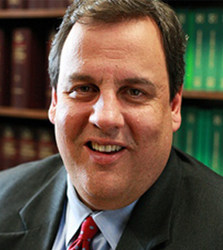
Christie Could Face Rocky Road After New Hampshire
Candidates who either start at the back of the pack or drop there later often pin their hopes on doing well in a single state, usually Iowa or New Hampshire, with the thought that a good showing there will catapult them into contention for the nomination. It’s not a bad strategy, but it does have a huge weakness – the difficulty in quickly building the sort of organization needed in the later states to remain competitive.
Politico this morning focuses on New Jersey Gov. Chris Christie, who has seen a surge in interest and support over the past few weeks after languishing at the back of the pack for most of the year:
Chris Christie's post-New Hampshire plan: A wing and a prayer
The past few weeks have been the best of Chris Christie’s campaign. He’s bagged important endorsements, gained ground in New Hampshire and his once-moribund campaign is suddenly getting a second look….
But there's one glaring problem: Christie has almost no campaign infrastructure beyond the first-in-the-nation primary state….
Without any organization to plug into, Christie runs the risk of not being able to capitalize on any momentum gained from a strong New Hampshire performance.
The campaign says there is still enough time to organize in post-New Hampshire states, pointing to their ability to get on the ballot in several states through the assistance of volunteers:
The Christie campaign insists there’s still time to get organized in South Carolina and later states. Already, they note, the governor's campaign — with the help of both staff and volunteers — is gathering signatures to get on the ballot or has gotten on the ballot in a number of upcoming primary states….
[Christie campaign chief strategist Mike] DuHaime expressed confidence that the campaign is capable of quickly assembling an organization for competing in South Carolina and beyond when the time comes — despite the huge head start the governor's rivals will have.
"For us, it's a matter of timing on when to do that," DuHaime said of staffing up in more states. "I know there are campaigns that are choosing to spend money now in some of these states that are later in the calendar and we're choosing not to, but that doesn't mean that we can't move quickly and we don't have people that are with us in those states and the ability to build an infrastructure very quickly."
There’s some truth to the argument that getting on the ballot is a signal that some organization exists in states that vote after New Hampshire, although it’s worth noting that with the exception of former New York Gov. George Pataki and former Virginia Gov. Jim Gilmore, every other Republican contender has also qualified for every state with a deadline so far.
And while Christie qualified for the Ohio ballot yesterday, and Tennessee’s earlier this month, he didn’t file a full slate of delegates in either state, suggesting that his organization still has some problems. From WSB Radio in Atlanta:
“Chris Christie fails to file full delegate slate in Ohio,” read the headline in the Cleveland Plain Dealer newspaper, as Christie was able to qualify for no more than 35 of a possible 48 delegates in the Buckeye State….
The delegate shortfall in Ohio for Christie and [Rand] Paul was not a one time event, as both GOP candidates failed earlier this month in Tennessee to put together a full slate, while the top contenders in the Republican race did that easily.
Here are the delegate numbers filed by each candidate in the Volunteer State as provided by the Tennessee Secretary of State (55 maximum):
Trump – 55
Rubio – 55
Carson – 55
Cruz – 55
Bush – 52
Huckabee – 39
Kasich – 25
Paul – 23
Santorum – 16
Fiorina – 10
Christie – 5Back in November, Christie failed to sign up any delegates for the primary in Alabama, where 47 delegates will be at stake on March 1
Christie’s organizational woes reflect a situation that at least a half-dozen candidates would like to have at the moment: the need to build an organization to compete in later states. But it’s still a problem, and one that the Christie campaign needs to address quickly to have any hope of remaining relevant even if he has a strong finish in New Hampshire.



